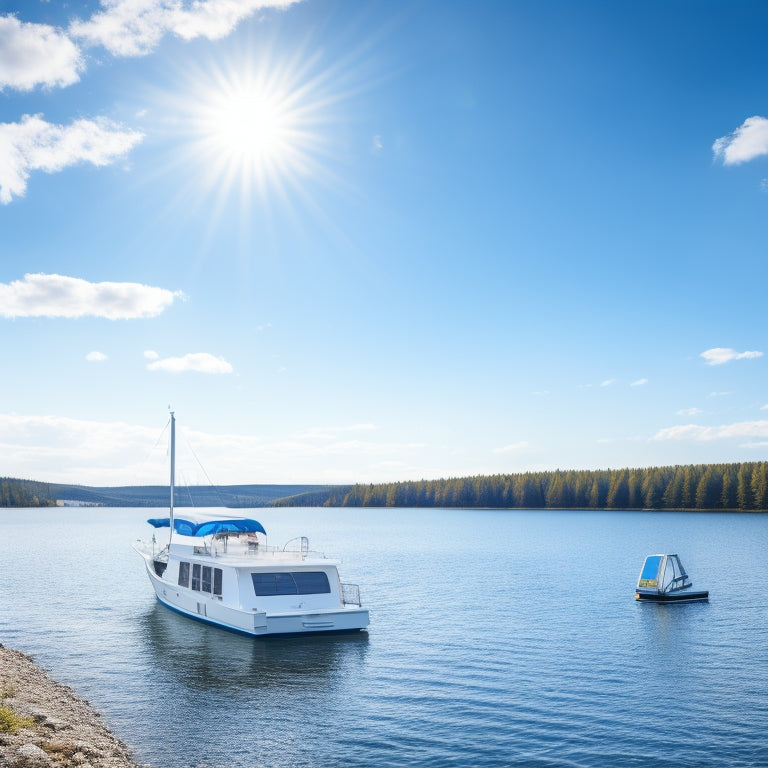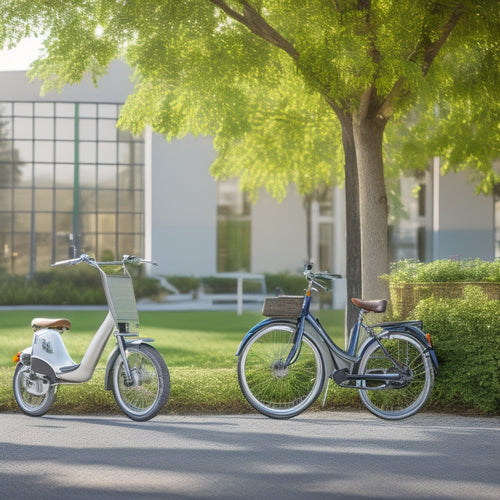
Selecting Solar Panel Kits for Boat and RV Owners
Share
When selecting a solar panel kit for your boat or RV, you'll want to calculate your daily energy consumption in watt-hours to choose the right kit size. Consider the type of kit you need, such as portable or marine-grade, and make sure it's compatible with your electrical system. Don't forget to factor in mounting and installation expenses, as well as battery and charge controller costs. Research top brands like Renewable Innovations and Marine Solutions, and invest in a kit designed for harsh marine environments. As you navigate the selection process, you'll discover the key to accessing efficient, reliable energy for your adventures.
Key Takeaways
• Calculate daily energy consumption in watt-hours (Wh) to determine the required solar panel kit size for your boat or RV.
• Consider portable and marine-grade solar panel kits designed for harsh outdoor conditions and compact storage.
• Ensure the solar panel kit is compatible with your electrical system, and factor in mounting and installation expenses in your budget.
• Choose a kit with a modular design and high-quality components, such as charge controllers and inverters, from reputable brands like Renewable Innovations and Marine Solutions.
• Regularly inspect and maintain your solar panel kit to ensure optimal performance and extend its lifespan.
Understanding Your Energy Needs
To determine the right solar panel kit for your boat or RV, you first need to calculate your daily energy consumption in watt-hours (Wh), which is the total amount of electricity your appliances and devices use in a 24-hour period. This is essential in ensuring you get a solar panel kit that can meet your energy needs.
Conducting an energy audit is an excellent way to identify areas of energy inefficiency and determine how much energy you need to generate. An energy audit involves monitoring your energy usage patterns, identifying energy-intensive appliances, and calculating your overall energy consumption.
Energy diagnostics tools can also be used to analyze your energy usage data and provide recommendations for energy efficiency improvements. By understanding your energy needs, you'll be able to choose a solar panel kit that can provide sufficient power to run your appliances, devices, and systems.
This will help you avoid undersizing or oversizing your solar panel kit, which can lead to inefficient energy generation and wasted resources.
Types of Solar Panel Kits
You'll find that solar panel kits for boats and RVs come in various configurations, each designed to cater to specific energy needs and installation requirements. When selecting a kit, it's essential to consider your energy demands, available space, and the type of installation you prefer.
For instance, portable kits are ideal for occasional use or supplementing your energy needs. These kits are lightweight, compact, and often come with a built-in charge controller and carrying case. They're perfect for small boats or RVs with limited roof space.
If you're a serious boater or RVer, you may require more substantial energy solutions. Marine grade kits are designed specifically for the marine environment, with components built to withstand harsh saltwater conditions, high winds, and intense sunlight. These kits typically include high-efficiency solar panels, a robust mounting system, and a waterproof charge controller.
Key Features to Consider
When selecting a solar panel kit for your boat or RV, consider the following key features to ensure you get the right system for your energy needs. One important aspect is Panel Durability, as your kit will be exposed to harsh outdoor conditions. Look for panels with sturdy frames, corrosion-resistant materials, and a robust design that can withstand wind, rain, and extreme temperatures.
Another vital feature is System Expandability. You may not need a large system now, but you might want to add more panels in the future. Make sure your kit allows for easy expansion, so you can upgrade your system as your energy needs grow. Consider kits with modular designs, which enable you to add or remove panels as needed.
Additionally, consider the type of charge controller, inverter, and mounting hardware included in the kit. These components should be compatible with your boat or RV's electrical system and meet your specific energy requirements.
Sizing Your Solar Panel Kit
Properly sizing your solar panel kit is essential to meeting your boat or RV's energy demands, as an undersized system can leave you short on power, while an oversized one can be a costly waste of resources.
To get it right, you'll need to calculate your power requirements. Start by making a list of all the appliances and devices you plan to power, along with their wattage and daily usage. This will give you a total daily energy requirement in watt-hours (Wh).
Next, consider the efficiency of your solar panel kit, as well as any potential losses due to shading, cable resistance, and other factors. This will help you determine the minimum required panel size and configuration. Efficiency calculations can be complex, but online tools and solar panel manufacturers often provide resources to simplify the process.
Mounting and Installation Options
When it comes to mounting and installing your solar panel kit, you'll need to evaluate the best option for your boat or RV. You'll want to choose a mounting system that securely fastens your panels to your roof or deck, while also allowing for adjustments to optimize energy production.
From roof-mounted solar panels to adjustable clamping systems, you'll need to weigh the pros and cons of each option to find the one that works best for your specific needs.
Roof-Mounted Solar Panels
You'll need to take into account several factors when selecting a roof-mounted solar panel system, including the type of mounting hardware, the size and number of panels, and the installation method.
For boat owners, marine integration is essential, making sure that the solar panels are designed to withstand the harsh marine environment. You'll want to take into account the panel angles, which can greatly impact energy production. A slight tilt can improve energy output, especially during peak sun hours.
When it comes to installation, you'll need to make certain that the solar panels are securely fastened to the roof of your boat or RV. This requires careful planning and measurement to guarantee the mounting hardware is compatible with your vehicle's roof.
Additionally, you'll need to take into consideration the weight and durability of the mounting system, as well as any potential obstructions, such as vents or antennas. By carefully evaluating these factors, you can ensure a successful roof-mounted solar panel installation that meets your energy needs while withstanding the rigors of life on the water or the open road.
Adjustable Clamping Systems
By selecting adjustable clamping systems, you can ensure a secure and adaptable mounting solution that accommodates varying roof sizes and types, while also allowing for easy panel angle adjustments to maximize energy production. This innovative approach guarantees a reliable and efficient solar panel installation on your boat or RV.
With adjustable clamping systems, you can effortlessly adjust the panel's angle to optimize energy harvesting, regardless of the roof's pitch or curvature.
In marine applications, clamping innovations play an important role in withstanding harsh environmental conditions, such as saltwater exposure and high winds. Adjustable clamping systems are designed to provide a snug, secure fit that won't compromise the structural integrity of your vessel or RV.
Battery Charging and Monitoring
Regularly monitoring your battery's state of charge is essential to guarantee peak performance and prolong its lifespan. As a boat or RV owner, you know that a well-maintained battery is important for a reliable power supply. To achieve this, you'll need a reliable battery charging and monitoring system.
A voltage regulator is a key component in this system, ensuring that your battery is charged within a safe voltage range. It prevents overcharging, which can damage your battery and reduce its lifespan. A battery controller is another important component, as it regulates the flow of energy between your solar panel, battery, and appliances.
Budgeting for Your Solar Kit
Now that you've determined your energy needs, it's time to establish a realistic budget for your solar kit. You'll need to take into account the cost of the solar panels, charge controller, battery, and mounting hardware, as well as any additional components or accessories.
Assessing Energy Needs
You'll need to calculate your daily energy requirements to determine the size of the solar panel kit you'll require. This involves conducting an energy audit to identify the appliances and devices you'll be powering, their wattage, and the number of hours they'll be used daily. This information will help you create a power profile, which is essential in selecting the right solar panel kit for your boat or RV.
| Appliance/Device | Wattage | Daily Usage (hours) |
|---|---|---|
| Laptop | 65W | 4 |
| Refrigerator | 100W | 8 |
| Lights (x4) | 20W | 6 |
| Water Pump | 50W | 2 |
Setting a Budget
Determine how much you're willing to invest in your solar panel kit, as the cost will largely depend on the size and quality of the system, as well as any additional components or accessories you may need. Setting a budget will help you prioritize your financial priorities and make informed decisions about your solar kit.
When setting your budget, consider the following factors:
-
System size and quality: A larger, high-efficiency system will cost more, but provide more power.
-
Mounting and installation: You may need to invest in a mounting system, wiring, and installation costs.
-
Battery and charge controller: If you want to store excess energy, you'll need to factor in the cost of a battery and charge controller.
- Monitoring and maintenance: You may want to invest in a monitoring system to track your energy production and plan for future maintenance costs.
Top Brands for Boat and RV
When shopping for solar panel kits, boat and RV owners frequently rely on reputable brands that have established themselves as leaders in the industry, offering high-quality products and reliable performance. You want to invest in a brand that understands your specific needs, whether you're sailing the open waters or exploring the great outdoors.
Renewable Innovations, for instance, specializes in solar solutions for maritime and mobile applications, providing customized kits tailored to your energy requirements. Marine Solutions is another trusted brand, offering a range of solar panel kits designed specifically for boat owners. Their products are built to withstand harsh marine environments, ensuring you stay powered up even in rough seas.
Maintenance and Troubleshooting Tips
Regularly inspecting and maintaining your solar panel kit guarantees peak performance, prevents energy loss, and identifies potential issues before they become major problems. As a boat or RV owner, staying on top of maintenance is crucial to make sure your solar panel kit operates efficiently.
Here are some maintenance and troubleshooting tips to keep in mind:
-
Daily inspections: Take a few minutes daily to visually inspect your solar panels for dirt, debris, or damage. Clean the panels regularly to make certain of maximum energy absorption.
-
Monitor your system: Keep an eye on your solar panel kit's performance using the built-in monitoring system or a mobile app. This helps you pinpoint potential issues before they escalate.
-
Fault diagnosis: Learn to diagnose common faults, such as faulty inverters or loose connections. This knowledge will assist you in troubleshooting and resolving issues quickly.
- Scheduled maintenance: Schedule regular maintenance checks to guarantee your solar panel kit is functioning correctly. This includes checking electrical connections, cleaning the panels, and inspecting the mounting system.
Frequently Asked Questions
Can I Use a Solar Panel Kit to Power My Air Conditioner?
"Sweat drips down your face as you imagine a scorching summer day, but can you really cool down with a solar panel kit powering your air conditioner? Unfortunately, it's unlikely, considering the high cooling capacity and energy efficiency required to run an AC."
Will Shading From Trees or Sails Affect Solar Panel Performance?
When you're contending with partial shading from trees or sails, you'll notice a significant impact on your solar panel's performance. Secure the best panel orientation to minimize losses, as even slight shading can reduce energy output by up to 50%.
Are Solar Panels Damaged by Saltwater or High Humidity?
Like a ship sailing through stormy waters, you're wise to take into account the impact of saltwater and humidity on solar panels. Fortunately, most modern panels boast saltwater resistance and corrosion protection, ensuring your energy harvest remains unaffected.
Can I Add More Solar Panels to My Kit Later On?
You can easily expand your system later, thanks to built-in expansion options, ensuring seamless scalability; this flexibility allows you to add more solar panels as your energy needs grow, without having to replace the entire system.
Do I Need a Professional to Install My Solar Panel Kit?
"Embarking on a DIY adventure, you'll navigate wiring complexity and electrical knowledge hurdles, but with sufficient roof size and DIY skills, you can avoid installation costs, though it's wise to weigh the risks and consider professional guidance."
Related Posts
-

5 Tips for Efficient Last Mile EV Delivery
You're looking to supercharge your last mile EV delivery operations. Start by optimizing your fleet operations to red...
-

What Are the Best Eco-Friendly Rides for Campus?
As you navigate your college campus, you have a wide range of eco-friendly ride options to choose from, including bic...
-

5 Best Online Stores for Green Vehicle Solutions
You're on the hunt for an eco-friendly ride, and online stores are a great place to start. You'll find top retailers ...


